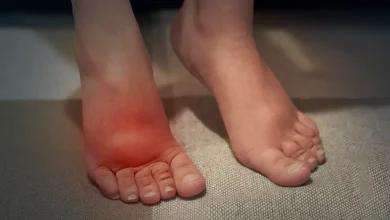What is Dandruff?

Dandruff is a condition that leads to the skin on the scalp to flake. It’s a common condition and isn’t contagious or serious but can be embarrassing and you may find it difficult sometimes to treat. A gentle daily shampoo can treat mild dandruff and if it doesn’t work, a medicated shampoo might be helpful. The symptoms may reoccur later. Dandruff is a mild form of seborrheic dermatitis that might get worse if you are sick or stressed. Cold, dry winters can cause dandruff or make it worse, too. A common cause of dandruff is seborrheic dermatitis, or seborrhea which might appear in other areas of the body, like the ears, the centre of the face, and the centre of the chest.
What are the Types of Dandruff?
The types of dandruff include:
– Dry skin dandruff
It is a common type of dandruff that tends to occur more during the winter months as cold weather and indoor heating might make your skin dry, including the skin on your scalp which mostly causes dandruff. Regularly washing your hair in hot water can also result in dry skin dandruff. A scalp that’s too dry might become irritated and shed skin cells which leads to dry skin dandruff. Dry skin dandruff flakes are white and small and white which makes you feel itchy, but not too excessively. Professional medical care may be needed if the itchiness becomes severe as it might cause a comparatively serious skin problem.
– Oily skin dandruff
The glands that produce sebum located below your skin produce an oily substance that moisturises and safeguard your skin. Your hair might become oily if these sebaceous glands produce too much sebum. The extra oil can clump together, irritating your scalp and resulting in dandruff. Oily skin dandruff flakes are bigger than dry skin dandruff. The colour of the flakes might seem more yellow than white, and oilier, too. Regularly shampooing your hair with a medicated shampoo can control oily skin dandruff.
– Fungus-related dandruff
Malassezia is a common type of fungus found on the skin of every human being which can cause dandruff in a few people. It can also trigger an inflammatory response that causes dandruff or other conditions, like eczema. A shampoo with Malassezia-inhibiting ingredients, including zinc pyrithione, might help to alleviate the problem of fungus-related dandruff. Using diluted tea tree oil or a shampoo containing tea tree oil can be helpful to decrease and control fungus-related dandruff.
– Disease-related dandruff
Some common skin conditions, such as eczema, psoriasis, and seborrheic dermatitis, might affect your scalp and cause dandruff.
– Seborrheic dermatitis
People with oily skin are quite prone to seborrheic dermatitis which is a serious type of oily skin dandruff. Along with the flakes, seborrheic dermatitis can also cause itching and red scaly patches. An effective way to treat dandruff caused by seborrheic dermatitis is using a shampoo containing zinc pyrithione.
– Eczema
Eczema can cause patches of flaky, itchy skin, and sometimes a red rash, and when it appears on your scalp, it can cause flakes that are generally bigger in size than dry skin dandruff flakes. There may be irritated skin on your scalp.
What are the Symptoms of Dandruff?
The symptoms of dandruff include:
– Skin flakes on your hair, scalp, shoulders, eyebrows, beard, and moustache.
– Itchy Scalp
– Infants with cradle caps may have crusty, scaly scalps.
What are the Causes of Dandruff?
There may be various causes of dandruff including:
– Oily and irritated skin
– Dry skin
– A yeastlike fungus called Malassezia that feeds on oils on the scalps of the people
– Being sensitive to hair care products
– Other skin conditions, like eczema and psoriasis
What are the Risk Factors of Dandruff?
The risk factors of dandruff include:
– Age
Dandruff generally begins in young adulthood and mostly continues till middle age but it does not mean that old people don’t get dandruff. Sometimes dandruff can be a lifelong problem.
– Sex
Males are more prone to dandruff than females
– Other conditions
Some other conditions such as Parkinson’s disease and other diseases can cause dandruff by affecting your nervous system. Other conditions such as HIV or a weak immune system can also increase the risk of getting dandruff.
What are the Complications of Dandruff?
Dandruff usually does not cause any serious or long-term complications but it can make you feel embarrassed and uneasy in public, thus adversely affecting your self-esteem. It can also cause bacterial or fungus infections in the skin.
How To Diagnose Dandruff?
One can diagnose dandruff easily just by looking at it. If you notice small, white skin patches on your hair, scalp, shoulders, etc, then it means you have dandruff. There is no need to go to any medical expert or do any test to diagnose dandruff as it can be detected by you just by looking at the affected areas.
What are the Treatment Options Available for Dandruff?
Dandruff usually goes away by itself but if it remains for more than two days and causes symptoms like itching then medical assistance may be needed. For mild dandruff, shampooing your hair with a gentle shampoo to decrease oil and skin cell buildup might help. If dandruff does not go away, then you can try a medicated dandruff shampoo. Some people use medicated shampoo two to three times a week, with regular shampooing on other days if required. Regular shampooing and a moisturising conditioner for the hair or scalp might help people with drier hair. Nowadays, there are various medicated and non-medicated solutions, foams, gels, sprays, ointments, and oils available and you can try a few of them to get rid of dandruff from your hair and scalp.
Dandruff shampoos are categorised according to the medication they contain and you can use one according to the type of dandruff you have. Some shampoos available to cure the problem of dandruff include:
– Pyrithione zinc shampoos
These shampoos contain antibacterial and antifungal agent zinc pyrithione.
– Tar-based shampoos
Coal tar slows how fastly skin cells on your scalp die and flake off. If you have light-coloured hair, this type of shampoo may discolour your hair making your scalp more sensitive to sunlight.
– Shampoos containing salicylic acid
These shampoos help to remove scaling.
– Selenium sulphide shampoos
These shampoos contain antifungal agents. You have to use them as directed and rinse well after shampooing, as they might discolour your hair.
– Ketoconazole shampoos
These shampoos remove dandruff-causing fungi living on your scalp.
– Fluocinolone shampoos
These shampoos control itching, flaking, and irritation as they contain corticosteroids.
Living with Dandruff
Dandruff is a common problem and everyone gets them once in a while. Most of the time, dandruff goes away by itself. Using mild shampoo helps to eliminate dandruff from hair and scalp. Dandruff does not cause many severe issues except itching and irritation sometimes but dandruff can be embarrassing in public. If your dandruff is not going even after using shampoo for two-three times, then you might need medicated dandruff shampoo to remove dandruff.
Whom to Consult?
Dandruff usually goes away by itself and doesn’t need any medical assistance. But if your condition doesn’t improve with regular use of dandruff shampoo then you might need to meet a dermatologist who will check your condition and take steps to eliminate dandruff from your hair and scalp accordingly.





